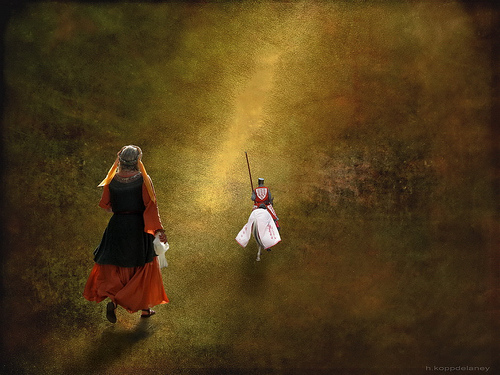In order to connect with us meager humans in the real world, a fantasy novel needs to have at least a few things in common with life as we know it.
Your populace could well have tentacles about their mouths or three arms at the top of their heads or hair on the bottoms of their feet.
Even wings… do tell!
Whatever your imagination desires. Yet if they’re sentient at all, your creatures need to be about something.
Face it: No one wants to read a whole novel about grazing brutes with no sense of themselves. Even the characters in Animal Farm had consciousness, which they used to make choices of moral consequence.
Fantasy characters don’t have to look human. Fantasy worlds aren’t required to adhere to the laws of physics. Nevertheless, being a book to read on planet Earth, a fantasy faces three human questions:
1. What Is the Meaning of Life?

Lots of Life photo credit: Tangent~Artifact, here sometimes 🙂 via photopin cc
Once consciousness awakes, it searches for its meaning.
•Why am I here?
•What am I to do now?
•Why in the heck is there such a thing as life in the first place?
During a hero or heroine’s quest, they come up against the question of what it’s all about anyhow…
And if it’s worth it.
Without some meaning there is no reason for the hero to proceed, and worse, there’s no reason for the reader to proceed. Then the book is closed.
That’s bad for writer and reader.
But once the hero poses the question of why he or she should go on, at that moment the novel itself brushes up against the bigger question of the meaning of life.
Through this search for sense, the storyteller invites the reader to ponder these deeper issues for themselves.
Remember Frodo Baggins in The Lord of the Rings striving through trials and pain in the fulfillment of his quest? The burden of the ring sapped his life but not his hope of a safe Shire. This was in spite of the realization that few hobbits would ever know of his sacrifice. But his hope, this meaning, Frodo found the reasons to continue on.
Trudging across Mordor, Frodo encountered the second life question: Of suffering.
2. Why Must We Suffer?

Setting Out photo credit: h.koppdelaney via photopin cc
Stories by definition have conflict. Conflict means suffering.
Didn’t Yoda say something like that?
Fantasy characters must encounter suffering. Otherwise the story would be boring and no story at all.
Stories, whether fantasy or not, face the why.
•Why is this conflict happening?
•Why do the evil prosper while the righteous suffer
•Is there any point to suffering, any justice?
The very fact that we human readers look for this answer – that we know there must be justice – reveals how deeply we hope for an answer.
We have faith that somewhere waits a sum total to both life and suffering.
Remember how much Harry Potter suffered in pain and loss? The mark of his lightening scar did not lead to pride but to suffering. But he suffered with the view that justice and good and love would win out over evil by the end.
Walking into the Forbidden Forest to face Voldemort, Harry came to meet the third question: Death.
3. What Is Death?

Dead Tree photo credit: seyed mostafa zamani via photopin cc
If death was not an ever-present reality, then why bother with meaning of life or suffering?
But we mortals stare into the abyss of the fear of death. And so must our fantasy characters. It is during that stare we wonder.
•Why is death a reality?
•How did our fear of it come about?
•Is there anything beyond it?
The question of death is where the first two questions really come home.
And why is this? Because death gives everything a push.
The fact of death hones the questions on life’s meaning and the suffering’s inevitability to a fine point, a sharp edge.
We begin to wonder – and fear – what happens afterwards.
Think on Aslan’s answers to the questions of death in The Chronicles of Narnia, especially when he tells Eustace Scrubb in The Silver Chair that most people had died already, even Himself.
As Eustace and Lucy and Edmund came to understand Aslan’s views on death, they found answers to life and suffering, too.
So it is with us. These three questions are bound up together.
A good answer to one fulfills the other two. It’s the same in philosophy or theology. Any philosophy or theology that doesn’t adequately answer these questions is washed up.
The basic questions of humanity don’t necessarily require solution within a fantasy novel. But fantasies are epic by nature. They need deal with these questions honestly and thereby prod the reader to seek his or her own answers.
That’s the quest of the reader as a human.




[…] a real God, not a fake one and certainly not one using me for some ulterior motive. I want real answers in a real […]
[…] not an evil… at least a good thing for themselves. They don’t seek self-misery; they seek significance. Now that may mean they make others suffer, but they don’t seek that for […]
[…] with… well, with humanity. Remember as we’ve discussed before, fantasies need to speak to the human condition. And, boy, did Dickens know how to do […]
[…] this awful carnage and waste, the trials and the pains of Middle Earth, been a picture painted by Tolkien of World War I, and Samwise a […]
[…] don’t get up in arms. This is the way it should be, because Tolkien’s story is one of high adventure, not boy meets girl. So we don’t expect much in the way of romance […]
[…] I don’t have control over death, […]
[…] real history, there’s plenty of fodder for this, seeing how our own world is sadly epic at certain points in […]
[…] I went to the counsel. Max, Charlie Ann, Wade, my parents, my grandparents. What would they say? Each one encouraged the go ahead. Each save one. My grandmother liked Dona and thought we would make a good couple. But my grandmother was not one to like change. She warned that hearts can be broken in time because life is tough. […]
[…] duke it out in the country. What’s the fun of that? The adult side of me hates to see the destruction, but the little boy in me likes monsters tromping through town and falling into […]
[…] impending marriage that is, not rules of war. Marriage isn’t supposed to be a battlefield. Life is the battlefield. You’re both in the foxhole together; don’t turn your rifles on each […]